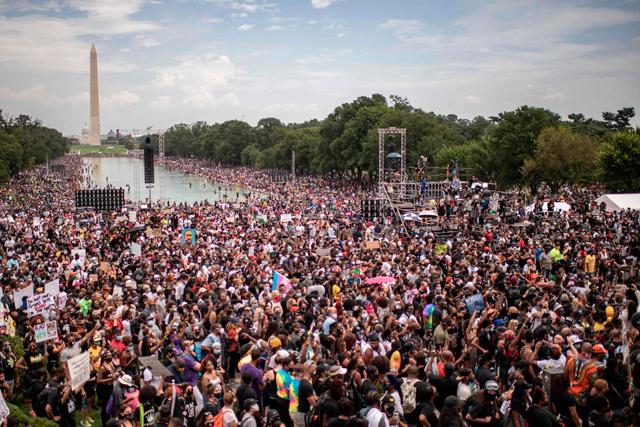- International News
- Sun-2020-08-30 | 03:42 pm

Crowds flooded the National Mall for a mass march marking the anniversary of Reverend Martin Luther King Jr's historic "I have a dream" speech on August 28, 1963.
Friday's demonstration was dubbed "Get Your Knee Off Our Necks," in reference to George Floyd, who suffocated beneath the knee of a white officer in Minneapolis in May, igniting the most widespread civil unrest in the country in decades.
Al Sharpton, the civil rights activist who gave the eulogy at Floyd’s funeral, told the crowd it was time for a "new conversation” with America.
"We need to have a conversation about your racism, about your bigotry, about your hate, about how you would put your knee on our neck while we cry for our lives,” he said.
Often fighting back tears, relatives of Floyd, Blake and Breonna Taylor — a black 26-year-old shot dead by police in her own apartment last March — took turns addressing the sea of people, who repeatedly called out the victims’ names in response.
"Black America, I hold you accountable,” said Blake’s sister Letetra Widman. "You must stand, you must fight, but not with violence and chaos. With self love.”
Like his father 57 years ago, Martin Luther King III stood on the Lincoln Memorial steps and urged Americans to keep fighting inequality — and to vote in November at all costs to defeat President Donald Trump.
"We are taking a step forward on America’s rocky but righteous journey towards justice,” King, at times wiping sweat from his brow, told a crowd enduring muggy Washington heat.
MLK’s granddaughter, 12-year-old Yolanda King, also spoke, telling the nation’s youth they would "be the generation that dismantles systemic racism once and for all”.
"Baby girl, tell your people!” a woman cried out.
Thousands of marchers, among them many families with children, streamed towards the event from dawn, with Covid-19 masks mandatory — but planned temperature checks were abandoned due to long queues.
Several sought shade under elm trees, waving hand fans. Some held signs that read "Racism Sucks!” and "Vote for Change”.
After the speeches, protesters marched toward the nearby Martin Luther King Memorial.
Karisha Harvey, 46 and black, held a poster depicting a weeping Statue of Liberty cradling a crying baby swaddled in an American flag.
"Not coming wasn’t an option,” Harvey told AFP.
Her white friend Cortney Smith, also 46, said: "I’m sick of hearing about a black man getting killed in the street every week.”
After mass protests sparked by Floyd’s death, outrage again swelled since Blake was shot multiple times in the back during a confrontation with police in Kenosha, Wisconsin.
Blake survived and is hospitalised, but may never walk again, according to the 29-year-old’s lawyer.
National anger
Authorities identified the officer who opened fire as Rusten Sheskey, saying police were attempting to arrest Blake and had tried to subdue him with a stun gun. They added that a knife had been found in his car.
In the violent and chaotic protests that followed in Kenosha, two people were shot dead by someone wielding an assault rifle.
Authorities arrested a 17-year-old in the killings and filed intentional homicide charges against him.
Major sports teams and leagues have called off matches to protest racism and police abuse, amid a rekindling of anti-racism demonstrations that have convulsed the country all summer.
Trump, who concluded the Republican National Convention on Thursday with a combative "law-and-order” speech, trails in polls for the November 3 election.
He has dismissed the wave of protests as criminal looting and violence — presenting himself a bulwark against social anarchy and a defender of the police.
"We will speak against the looting,” Sharpton shot back at Trump, "but when will you speak against wrong police shooting?”
The unrest has exploded into a critical election issue.
Joe Biden’s running mate Kamala Harris, the first woman of colour on a major party ticket, addressed the march by video and recalled the previous generation’s civil rights heroes.
"If they were with us today, they would share in our anger and frustration as we continue to see black men and women slain in our streets, and left behind by an economy and justice system that have too often denied black folks our dignity and rights,” she said.
Don Carlisle, a black man in his mid-50s attending Friday’s march with friends, voiced similar frustrations.
"We technically built this country and we are still treated unjustly,” he told AFP. "We have been looking for 300-400 years for equality.”













